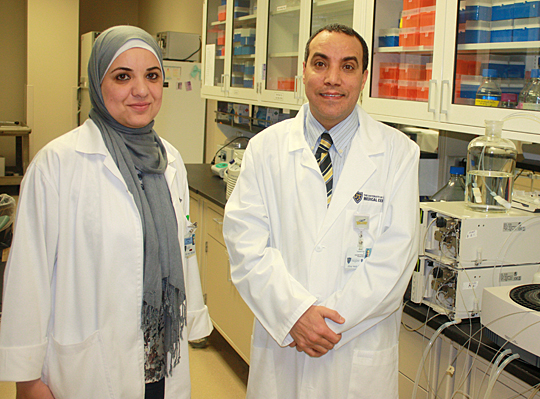This academic year, only seven Fulbright Scholars are visiting the United States from Jordan, and one is right here at The University of Toledo.
 Dr. Sawsan Abuhamdah, associate professor of neuropharmacology in the Department of Biopharmaceutics and Clinical Pharmacy at the University of Jordan in Amman, began studying at UT last fall and is here through May. With Dr. Youssef Sari, associate professor in the UT Department of Pharmacology, she is studying the effects of alcohol addiction on the brain.
Dr. Sawsan Abuhamdah, associate professor of neuropharmacology in the Department of Biopharmaceutics and Clinical Pharmacy at the University of Jordan in Amman, began studying at UT last fall and is here through May. With Dr. Youssef Sari, associate professor in the UT Department of Pharmacology, she is studying the effects of alcohol addiction on the brain.
“My specialty is in neuropharmacology, so anything related to the brain is attractive to me,” Abuhamdah said. “Alcohol addiction is similar to many drug addictions. If you concentrate on solving the problem of alcohol addiction, you solve many drug addictions like morphine and heroine.”
The title of her project is “Pharmacological Studies of Compounds Targeting Glutamate Transporter I in Brain for the Treatment of Alcohol Dependence.”
Abuhamdah first met Sari at the 2012 International Pharmacy Conference in Amman, Jordan, an event jointly organized by Al-Zaytoonah Private University of Jordan and The University of Toledo College of Pharmacy and Pharmaceutical Sciences. Sari attended along with Dr. Johnnie Early, dean and professor of the UT College of Pharmacy and Pharmaceutical Sciences; Dr. Amanda Bryant-Friedrich, UT associate professor of medicinal chemistry; and Dr. Sharrel Pinto, division head and UT associate professor of health outcomes and socioeconomic sciences.
Sari attended with the help of funding from Dr. Sammy Spann, assistant provost for student engagement. At the conference, Abuhamdah presented a topic dealing with the use of extracted compounds from plants in neuropharmacology.
When Abuhamdah saw the Fulbright announcement in April 2013, she contacted Sari for help preparing a proposal for the scholarship so that she could join his research lab at UT. She was attracted to UT not only because she already had a contact here, but because the University offered research techniques she had not used before.
One technique is called microdialysis, which she uses to look at protein expression related to drug addiction, including alcohol. To do this, researchers extract fluid from the brain directly and then analyze its content using an electrochemical detection machine.
“When I go back to Jordan, I will use the techniques that I learned to progress my research,” Abuhamdah said.
The University of Toledo also will benefit from having Abuhamdah on campus this year. Though she may be learning new techniques here, she also is passing on her knowledge to those who work with her, including Sari and the students in his lab.
Abuhamdah also helped Sari write a grant proposal for Qatar University to fund nicotine addiction research. She has helped him put together abstracts and collected literature, publication and techniques for the research.
She also has written a review article focused on treatments for nicotine addiction and will co-author at least two other publications from Sari’s laboratory.
“Ideally, if we get the funding from Qatar University, we can keep collaborating long term,” Sari said.
Doing research together and publishing will help both of their careers, adding to the already lengthy list of benefits they both receive from Abuhamdah studying here.
“In Jordan, it’s highly respected if you publish with someone in the U.S.,” Abuhamdah said. “And Dr. Sari is known in the field.”
For making the trip possible, they both would like to thank Dr. Ekhleif Tarawenh, president of the University of Jordan, Dr. Azmi Mahafza, vice president for scientific faculties affairs at the University of Jordan, and Alain McNamara, executive director at the Binational Fulbright Commission in Jordan.